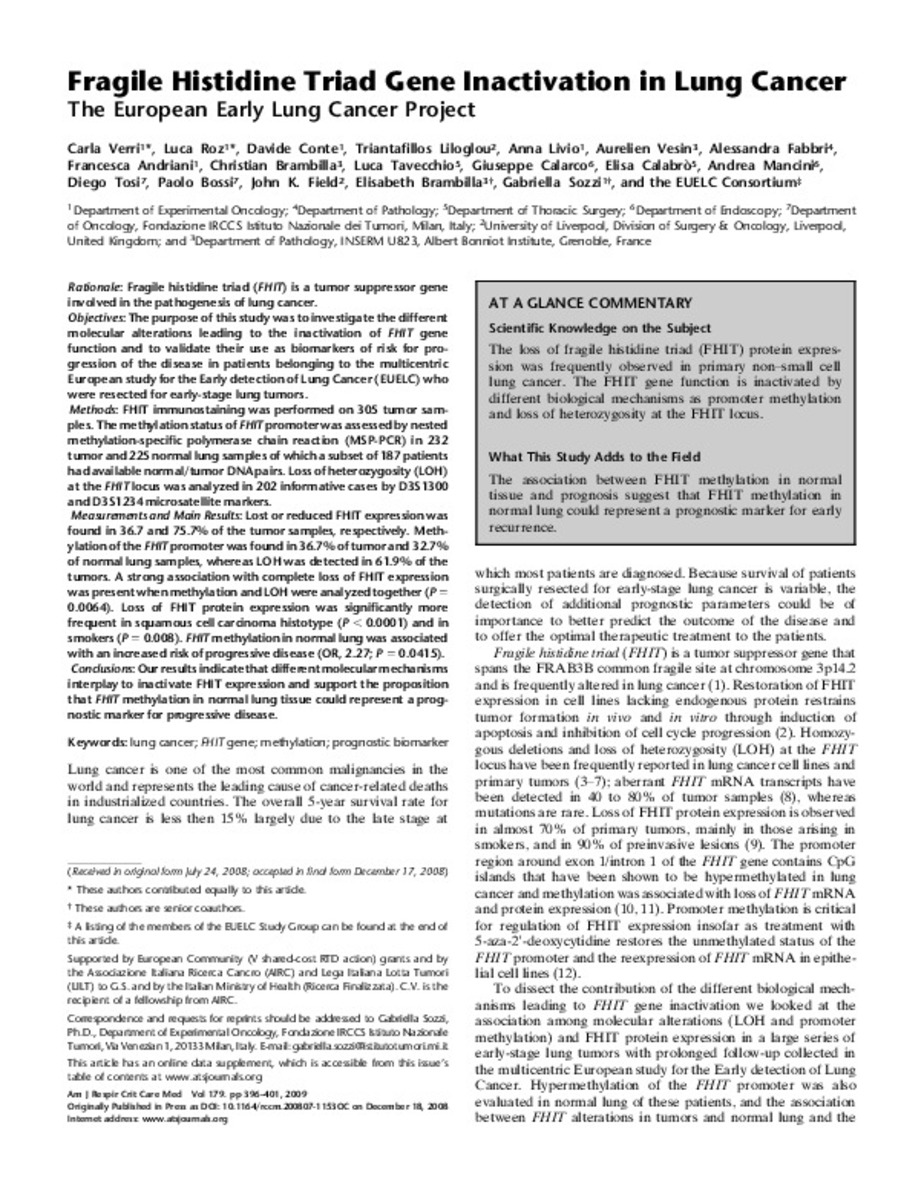Registro completo de metadatos
| Campo DC | Valor | Lengua/Idioma |
|---|---|---|
| dc.creator | Verri, C. (Carla) | |
| dc.creator | Roz, L. (Luca) | |
| dc.creator | Conte, D. (D.) | |
| dc.creator | Liloglou, T. (Triantafillos) | |
| dc.creator | Livio, A. (Anna) | |
| dc.creator | Vesin, A. (Aurelien) | |
| dc.creator | Andriani, F. (F.) | |
| dc.creator | Brambilla, C. (C.) | |
| dc.creator | Tavecchio, L. (Luca) | |
| dc.creator | Calarco, G. (G.) | |
| dc.creator | Calabro, E. (E) | |
| dc.creator | Mancini, A. (Andrea) | |
| dc.creator | Tosi, D. (Diego) | |
| dc.creator | Bossi, P. (P.) | |
| dc.creator | Field, J.K. (J. K.) | |
| dc.creator | Brambilla, E. (E.) | |
| dc.creator | Sozzi, G. (Gabriella) | |
| dc.creator | EUELC | |
| dc.date.accessioned | 2010-10-21T09:15:56Z | - |
| dc.date.available | 2010-10-21T09:15:56Z | - |
| dc.date.issued | 2009-03-01 | - |
| dc.identifier.citation | Verri C, Roz L, Conte D, Liloglou T, Livio A, Vesin A, et al. Fragile histidine triad gene inactivation in lung cancer: the European Early Lung Cancer project. Am J Respir Crit Care Med 2009 Mar 1;179(5):396-401. | es_ES |
| dc.identifier.issn | 1073-449X | - |
| dc.identifier.uri | https://hdl.handle.net/10171/13583 | - |
| dc.description.abstract | Rationale: Fragile histidine triad (FHIT) is a tumor suppressor gene involved in the pathogenesis of lung cancer. Objectives: The purpose of this study was to investigate the different molecular alterations leading to the inactivation of FHIT gene function and to validate their use as biomarkers of risk for progression of the disease in patients belonging to the multicentric European study for the Early detection of Lung Cancer (EUELC) who were resected for early-stage lung tumors. Methods: FHIT immunostaining was performed on 305 tumor samples. Themethylation status of FHIT promoterwas assessed by nested methylation-specific polymerase chain reaction (MSP-PCR) in 232 tumor and 225 normal lung samples ofwhich a subset of 187 patients had available normal/tumorDNA pairs. Loss of heterozygosity (LOH) at the FHIT locus was analyzed in 202 informative cases by D3S1300 and D3S1234 microsatellite markers. Measurements and Main Results: Lost or reduced FHIT expression was found in 36.7 and 75.7% of the tumor samples, respectively. Methylation of the FHIT promoter was found in 36.7%of tumor and 32.7% of normal lung samples, whereas LOH was detected in 61.9% of the tumors. A strong association with complete loss of FHIT expression was presentwhenmethylation and LOHwere analyzed together (P5 0.0064). Loss of FHIT protein expression was significantly more frequent in squamous cell carcinoma histotype (P , 0.0001) and in smokers (P5 0.008). FHIT methylation in normal lung was associated with an increased risk of progressive disease (OR, 2.27; P 5 0.0415). Conclusions:Our results indicate thatdifferentmolecularmechanisms interplay to inactivate FHIT expression and support the proposition that FHIT methylation in normal lung tissue could represent a prognostic marker for progressive disease. | es_ES |
| dc.language.iso | eng | es_ES |
| dc.publisher | American Thoracic Society | es_ES |
| dc.rights | info:eu-repo/semantics/openAccess | es_ES |
| dc.subject | Lung cancer | es_ES |
| dc.subject | Prognostic biomarker | es_ES |
| dc.subject | Methylation | es_ES |
| dc.subject | FHIT gene | es_ES |
| dc.title | Fragile histidine triad gene inactivation in lung cancer: the European Early Lung Cancer project. | es_ES |
| dc.type | info:eu-repo/semantics/article | es_ES |
| dc.identifier.doi | http://dx.doi.org/10.1164/rccm.200807-1153OC | es_ES |
Ficheros en este ítem:
Estadísticas e impacto
Los ítems de Dadun están protegidos por copyright, con todos los derechos reservados, a menos que se indique lo contrario.






